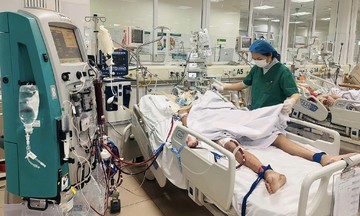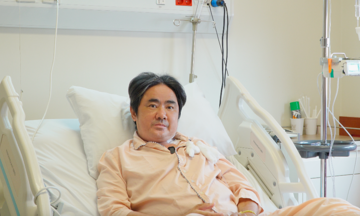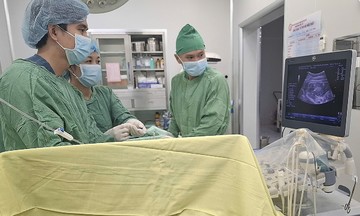Hang recounted that she was asleep when she felt a sharp pain in her ankle. She woke up to find a centipede the size of her little fingertip crawling on her bed. Initially, the wound swelled like a mosquito bite, slightly red, and felt stinging and itchy like a bee sting. The next morning, she felt nauseous, had difficulty breathing, and vomited, prompting her to seek emergency care at Tam Anh General Clinic in District 7.
Dr. Nguyen Huynh Duy Bang from the Emergency Department conducted clinical tests and determined that Hang was experiencing grade 2 anaphylaxis due to the centipede bite. The doctor explained that within minutes to hours after a centipede bite, the venom enters the body and triggers an immune response causing anaphylaxis. The patient may experience redness, itching, and mild swelling at the bite site or spreading to surrounding areas, accompanied by general discomfort but no dangerous symptoms like difficulty breathing, low blood pressure, or altered consciousness.
 |
The patient was prescribed medication and intravenous fluids according to the treatment protocol. Photo illustration: Tam Anh General Hospital |
After receiving medication according to the treatment protocol, Hang's condition stabilized, and she no longer felt discomfort. She was discharged but advised to continue monitoring her condition for 24 hours as the reaction could worsen.
There are 4 grades of anaphylaxis, the highest being grade 4, which can cause cardiac arrest and respiratory failure. Anaphylaxis can progress very quickly, from a mild allergic reaction (grade 1) to a severe or life-threatening one (grade 3 or 4).
Dr. Bang advised that if bitten by a centipede or other insects or small animals, individuals should immediately wash the wound with soap and water, then apply a cold compress to reduce swelling and pain. They should continue to monitor for any systemic reactions. If they experience difficulty breathing, chest tightness, dizziness, or widespread hives, they should immediately go to the nearest hospital for prompt treatment. During the rainy season, families should regularly clean their homes and control insects and reptiles, even in high-rise apartments.
Nhat Thanh
*The patient's name has been changed












